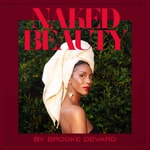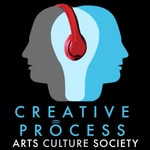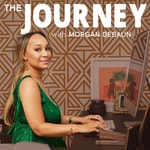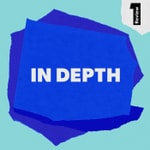Philosophy, Ideas, Critical Thinking, Ethics & Morality: The Creative Process: Philosophers, Writers, Educators, Creative Thinkers, Spiritual Leaders, Environmentalists & Bioethicists – Details, episodes & analysis
Podcast details
Technical and general information from the podcast's RSS feed.
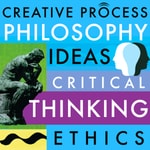
Philosophy, Ideas, Critical Thinking, Ethics & Morality: The Creative Process: Philosophers, Writers, Educators, Creative Thinkers, Spiritual Leaders, Environmentalists & Bioethicists
Philosophers, Writers, Educators, Creative Thinkers, Spiritual Leaders, Environmentalists & Bioethicists · Creative Process Original Series
Frequency: 1 episode/2d. Total Eps: 300

Philosophy episodes of the popular The Creative Process podcast. We speak to philosophers, writers, educators, spiritual leaders, environmentalists, bioethicists, artists & creative thinkers in other. disciplines To listen to ALL arts & education episodes of “The Creative Process · Arts, Culture & Society”, you’ll find our main podcast on Apple: tinyurl.com/thecreativepod, Spotify: tinyurl.com/thecreativespotify, or wherever you get your podcasts!
Exploring the fascinating minds of creative people. Conversations with writers, artists & creative thinkers across the Arts & STEM. We discuss their life, work & artistic practice. Winners of Oscar, Emmy, Tony, Pulitzer, leaders & public figures share real experiences & offer valuable insights. Notable guests and participating museums and organizations include: Academy of Motion Picture Arts & Sciences, Neil Patrick Harris, Smithsonian, Roxane Gay, Musée Picasso, EARTHDAY.ORG, Neil Gaiman, UNESCO, Joyce Carol Oates, Mark Seliger, Acropolis Museum, Hilary Mantel, Songwriters Hall of Fame, George Saunders, The New Museum, Lemony Snicket, Pritzker Architecture Prize, Hans-Ulrich Obrist, Serpentine Galleries, Joe Mantegna, PETA, Greenpeace, EPA, Morgan Library & Museum, and many others.
The interviews are hosted by founder and creative educator Mia Funk with the participation of students, universities, and collaborators from around the world. These conversations are also part of our traveling exhibition. www.creativeprocess.info
For The Creative Process podcasts from Seasons 1, 2, 3 visit: tinyurl.com/creativepod or creativeprocess.info/interviews-page-1, which has our complete directory of interviews, transcripts, artworks, and details about ways to get involved.
INSTAGRAM @creativeprocesspodcast
Recent rankings
Latest chart positions across Apple Podcasts and Spotify rankings.
Apple Podcasts
🇬🇧 Great Britain - philosophy
06/08/2025#71🇨🇦 Canada - philosophy
04/08/2025#98🇨🇦 Canada - philosophy
03/08/2025#70🇬🇧 Great Britain - philosophy
02/08/2025#90🇬🇧 Great Britain - philosophy
01/08/2025#52🇬🇧 Great Britain - philosophy
31/07/2025#38🇫🇷 France - philosophy
31/07/2025#98🇫🇷 France - philosophy
30/07/2025#82🇬🇧 Great Britain - philosophy
29/07/2025#80🇫🇷 France - philosophy
29/07/2025#54
Spotify
No recent rankings available
Shared links between episodes and podcasts
Links found in episode descriptions and other podcasts that share them.
See all- http://www.creativeprocess.info
4801 shares
- http://www.oneplanetpodcast.org
4152 shares
- https://studiorichtermahr.com
247 shares
- https://twitter.com/palumboliu?s=20
270 shares
- https://twitter.com/mroth78
44 shares
- https://twitter.com/dfenton?lang=en
22 shares
RSS feed quality and score
Technical evaluation of the podcast's RSS feed quality and structure.
See allScore global : 63%
Publication history
Monthly episode publishing history over the past years.
How can journalism make people care about crises & create solutions? - Highlights - NICHOLAS KRISTOF
Season 13
lundi 26 août 2024 • Duration 16:26
“"I'm trying to get people to care about a crisis in ways that may bring solutions to it. And that's also how I deal with the terror and the fear to find a sense of purpose in what I do. It's incredibly heartbreaking to see some of the things and hear some of the stories, but at the end of the day, it feels like–inconsistently here and there–you can shine a light on problems, and by shining that light, you actually make a difference.
If you look over the last 500 years or so, the best metric to predict where society will be in 30 or 50 years, the best metric is simply education today. One reason I think the U.S. is the world's largest and most successful economy today is that, beginning in the 19th century and through about 1970, the U.S. led the world in mass education. And what matters is not so much elite education. Britain had Eton, Oxford, and Cambridge, and it had better elite education, but it wasn't great at mass education. And the U.S. really was. We were the first country to have almost universal literacy, male and female. We were the first country to have widespread high school attendance and the first country to have significant college attendance. And then, beginning in about the 1970s, we lost that lead. And now, there are many countries that are way ahead of us. I think back to my old classmates who are now dead, and I think: What were adults thinking in the 1970s that they let them drop out? And yet, I think today: What are adults thinking in 2024 when they let one in seven American kids today drop out of high school and let so many emerge from the school system not literate, not numerate, completely unprepared for the 21st century?”
Nicholas D. Kristof is a two-time Pulitzer-winning journalist and Op-ed columnist for The New York Times, where he was previously bureau chief in Hong Kong, Beijing, and Tokyo. Kristof is a regular CNN contributor and has covered, among many other events and crises, the Tiananmen Square protests, the Darfur genocide, the Yemeni civil war, and the U.S. opioid crisis. He is the author of the memoir Chasing Hope, A Reporter's Life, and coauthor, with his wife, Sheryl WuDunn, of five previous books: Tightrope, A Path Appears, Half the Sky, Thunder from the East, and China Wakes.
Family vineyard & apple orchard in Yamhill, Oregon: www.kristoffarms.com
www.creativeprocess.info
www.oneplanetpodcast.org
IG www.instagram.com/creativeprocesspodcast
Chasing Hope: A Reporter's Life w/ Pulitzer Prize-winning Journalist NICHOLAS KRISTOF
Season 13
lundi 26 août 2024 • Duration 43:47
How can journalism make people care and bring about solutions? What role does storytelling play in shining a light on injustice and crises and creating a catalyst for change?
Nicholas D. Kristof is a two-time Pulitzer-winning journalist and Op-ed columnist for The New York Times, where he was previously bureau chief in Hong Kong, Beijing, and Tokyo. Kristof is a regular CNN contributor and has covered, among many other events and crises, the Tiananmen Square protests, the Darfur genocide, the Yemeni civil war, and the U.S. opioid crisis. He is the author of the memoir Chasing Hope, A Reporter's Life, and coauthor, with his wife, Sheryl WuDunn, of five previous books: Tightrope, A Path Appears, Half the Sky, Thunder from the East, and China Wakes.
“If you look over the last 500 years or so, the best metric to predict where society will be in 30 or 50 years, the best metric is simply education today. One reason I think the U.S. is the world's largest and most successful economy today is that, beginning in the 19th century and through about 1970, the U.S. led the world in mass education. And what matters is not so much elite education. Britain had Eton, Oxford, and Cambridge, and it had better elite education, but it wasn't great at mass education. And the U.S. really was. We were the first country to have almost universal literacy, male and female. We were the first country to have widespread high school attendance and the first country to have significant college attendance. And then, beginning in about the 1970s, we lost that lead. And now, there are many countries that are way ahead of us. I think back to my old classmates who are now dead, and I think: What were adults thinking in the 1970s that they let them drop out? And yet, I think today: What are adults thinking in 2024 when they let one in seven American kids today drop out of high school and let so many emerge from the school system not literate, not numerate, completely unprepared for the 21st century?”
Family vineyard & apple orchard in Yamhill, Oregon: www.kristoffarms.com
www.creativeprocess.info
www.oneplanetpodcast.org
IG www.instagram.com/creativeprocesspodcast
Photo credit: David Hume Kennerly
PRIYAMVADA GOPAL & FRANÇOISE VERGÈS on the Recent Elections in Britain & France
Season 13
vendredi 26 juillet 2024 • Duration 01:06:53
"I would say what we can celebrate is the incredible mobilization of the young people. They went everywhere, they knocked on the door, they mobilized. This was an incredible, incredible mobilization. So that was extraordinary because it showed real mobilization and an understanding that the National Rally was a real threat. We knew that if they came to power, the first people who would be targeted would be people of color, and that was absolutely clear."
For our snap episode on the snap elections in the UK and France, Professor David Palumbo-Liu and Azeezah Kanji talk with eminent decolonial scholar activists, Françoise Vergès in France and Priyamvala Gopal in the UK. Following the defeat of right wing parties in both countries in the polls, we discuss what's changed with the elections, what hasn't changed, and what should movements, activists, and organizers be focusing on.
Priyamvada Gopal is Professor of Postcolonial Studies at the Faculty of English, University of Cambridge and Professorial Fellow, Churchill College. Her present interests are in the literatures, politics, and cultures of empire, colonialism and decolonisation. She has related interests in the novel, South Asian literature, and postcolonial cultures. Her published work includes Literary Radicalism in India: Gender, Nation and the Transition to Independence (Routledge, 2005), After Iraq: Reframing Postcolonial Studies (Special issue of New Formations co-edited with Neil Lazarus), The IndianEnglish Novel: Nation, History and Narration (Oxford University Press, 2009) and, most recently, Insurgent Empire: Anticolonial Resistance and British Dissent (Verso, 2019) which was shortlisted for the British Academy Prize for Global Cultural Understanding and the Bread and Roses Prize. Her writing has also appeared in The Hindu, Outlook India, India Today, The Independent, Prospect Magazine, The New Statesman, The Guardian, Al-Jazeera English (AJE) and The Nation (USA). She is working on a new project called Decolonization: the Life and Times of an Idea which examines a range of thinkers, contexts and struggles across the Global South.
Françoise Vergès is a writer and decolonial antiracist feminist activist. A Reunionnese, she received an education that ran counter to the French hegemonic school from her anticolonial communist and feminist parents and the members of their organisations. She received her Ph.D in Political Theory from Berkeley University in 1995. She remained an activist during these years, collaborated on Isaac Julien’s film "Black Skin, White Masks » and published in feminist and theory journals. She has taught at Sussex University and Goldsmiths College and has been a visiting professor at different universities. She has never held a teaching position in France but created the Chair Global South(s) at Collège d’études mondiales where she held workshops on different topics (2014-2018). She was president of the National Committee for the History and Remembrance of Slavery (2009-2012), was a co-founder of Decolonize the Arts (2015-2020), the director of the scientific and cultural programme for a museum project in Reunion Island (2004-2010, a project killed by the State and the local conservatives). She is the convener and curator of L’Atelier a collective and collaborative seminar/public performance with activist and artists of color. Recent publications include: Programme de désordre absolu. Décoloniser le musée (2023), A Feminist Theory of Violence (2021), De la violence coloniale dans l’espace public (2021), The Wombs of Women. Capital, Race, Feminism (2021), A Decolonial Feminism (2020).
www.palumbo-liu.com
https://speakingoutofplace.com
https://twitter.com/palumboliu?s=20
www.instagram.com/speaking_out_of_place
LEWIS DARTNELL - Author of Origins: How the Earth Made Us & Being Human: How Our Biology Shaped World History
Season 12
samedi 3 février 2024 • Duration 46:09
How have our psychology and cognitive biases altered the course of human history? What would you do if you had to rebuild our world from scratch?
Lewis Dartnell is an author, researcher, and holds the Professorship in Science Communication at the University of Westminster. He researches astrobiology and the search for microbial life on Mars. He also works as a scientific consultant for the media and has appeared in numerous TV documentaries and radio shows. Dr. Dartnell has won several awards for his science writing and outreach work. He has published five books, including The Knowledge: How to Rebuild our World from Scratch; Origins: How the Earth Made Us; and Being Human: How Our Biology Shaped World History.
"It seems that a lot of education is a little bit obsessed with training students to remember facts and figures. In the modern world, when every one of us has got the total of human knowledge in our pockets, it's much less important what you can hold in your head and what you can remember because you can just look it up whenever it becomes important, and it's now how you interpret or analyze or synthesize that information and developing skills and techniques in rapidly understanding and interpreting and analyzing information and making decisions based on information. The internet has changed a huge amount about what is important to our lives and simplified many things that would have been examined on otherwise.
It's in finding things out for yourself that is that deep spark of human creativity, which gives us the innovation and all the sort of creativity and designs that we can come up with. So, I think that is something that you would absolutely want to try to continue nurturing yourself."
http://www.lewisdartnell.com
http://lewisdartnell.com/en-gb/2013/11/the-knowledge-how-to-rebuild-our-world-from-scratch
www.penguin.co.uk/books/433955/origins-by-lewis-dartnell/9781784705435
www.penguin.co.uk/books/442759/being-human-by-dartnell-lewis/9781847926708
www.creativeprocess.info
www.oneplanetpodcast.org
IG www.instagram.com/creativeprocesspodcast
Photo credit: Shortlist/Paul Stuart
How can we develop AI systems that are more respectful, ethical, and sustainable? - Highlights - DR. SASHA LUCCIONI
Season 12
mardi 30 janvier 2024 • Duration 12:25
“I think it's kind of important to think about the fact that originally, neural networks were inspired by neurons, really by our brains, but fundamentally, brains are really different than AI models, currently. Brains are quite efficient. For example, we won't be using all of our neurons all the time. If we're recognizing a face, or if we're speaking, or if we're drawing, or if we're watching a movie, or reading a book, there are different zones. And I think that that's kind of the core of the issue because whereas we can kind of use a portion of our brain, depending on the activity, neural networks don't have that built-in efficiency.”
What are the pros and cons of AI’s integration into our institutions, political systems, culture, and society? How can we develop AI systems that are more respectful, ethical, and sustainable?
Dr. Sasha Luccioni is a leading scientist at the nexus of artificial intelligence, ethics, and sustainability, with a Ph.D. in AI and a decade of research and industry expertise. She spearheads research, consults, and utilizes capacity-building to elevate the sustainability of AI systems. As a founding member of Climate Change AI (CCAI) and a board member of Women in Machine Learning (WiML), Sasha is passionate about catalyzing impactful change, organizing events, and serving as a mentor to under-represented minorities within the AI community. She is an AI Researcher & Climate Lead at Hugging Face, an open-source hub for machine learning and natural language processing.
https://www.sashaluccioni.com
https://huggingface.co/
http://www.climatechange.ai
https://wimlworkshop.org
DR. SASHA LUCCIONI - Founding Member Climate Change AI - Climate Lead & AI Researcher - Hugging Face
Season 12
mardi 30 janvier 2024 • Duration 31:25
What are the pros and cons of AI’s integration into our institutions, political systems, culture, and society? How can we develop AI systems that are more respectful, ethical, and sustainable?
Dr. Sasha Luccioni is a leading scientist at the nexus of artificial intelligence, ethics, and sustainability, with a Ph.D. in AI and a decade of research and industry expertise. She spearheads research, consults, and utilizes capacity-building to elevate the sustainability of AI systems. As a founding member of Climate Change AI (CCAI) and a board member of Women in Machine Learning (WiML), Sasha is passionate about catalyzing impactful change, organizing events, and serving as a mentor to under-represented minorities within the AI community. She is an AI Researcher & Climate Lead at Hugging Face, an open-source hub for machine learning and natural language processing.
“I think it's kind of important to think about the fact that originally, neural networks were inspired by neurons, really by our brains, but fundamentally, brains are really different than AI models, currently. Brains are quite efficient. For example, we won't be using all of our neurons all the time. If we're recognizing a face, or if we're speaking, or if we're drawing, or if we're watching a movie, or reading a book, there are different zones. And I think that that's kind of the core of the issue because whereas we can kind of use a portion of our brain, depending on the activity, neural networks don't have that built-in efficiency.”
https://www.sashaluccioni.com
https://huggingface.co/
http://www.climatechange.ai
https://wimlworkshop.org
How can enlightened self-interest advance social equity & climate action? - Highlights - DR. SHIV SOMESHWAR
Season 12
mardi 30 janvier 2024 • Duration 13:14
"Re-living the Memories of an Indian Forester was really a neat way of trying to tell you, the current generation, especially the youngsters, how managing forests is not just black-and-white. It's not that the governments and the state are this kind of 'evil', and then you have NGOs and communities, who are this kind of 'goody two shoes'. And how it's in the gray areas that you can actually make the most effective forest management. How do you actually bring the best of both? Because now we are so careless in the way we approach things we think we understand. And we're dismissive. We are quick to judgment. And that's one thing that I hope that in my class and the current generation really needs to be far more reflective. And not just because something doesn't gel with what they think is the right thing, is the just thing. They can't just dismiss it out of hand."
How do urbanization and rural development impact communities differently? How can we make public policy and enlightened self-interest advance climate action?
Dr. Shiv Someshwar is a Development Clinician, diagnosing development of cities and nation states. A Visiting Professor at Columbia University, New York and at Sciences Po, Paris, he was the founder chair-holder of the European Chair for Sustainable Development and Climate Transition at Sciences Po. He helped set up the initial national and regional networks of the global Sustainable Development Solutions Network.
His publications cover a range of issues: planning, institutions and governance of sustainable development; climate change mitigation, adaptation, risks and offsets; and ecosystem management. He edited Re-living the Memories of an Indian Forester: Memoirs of S. Shyam Sunder and is presently writing The Fallacy of Evidence-Based Policy Making.
He convened and chaired the Independent Task Force on Creative Climate Action. Dr. Someshwar received a Ph.D. in urban planning from the University of California, Los Angeles, and he was a Bell-MacArthur fellow at Harvard University. He has two masters’ degrees, on housing and on environmental planning, and is also trained as a professional architect. He has previously worked at the Earth Institute, Columbia University, the Rockefeller Foundation in New York, and the World Bank in Washington D.C.
https://www.sciencespo.fr/psia/sites/sciencespo.fr.psia/files/ITFClimateReport_Web.pdf www.amazon.com/Reliving-Memories-Indian-Forester-Memoir/dp/9388337131
www.creativeprocess.info
www.oneplanetpodcast.org
IG www.instagram.com/creativeprocesspodcast
DR. SHIV SOMESHWAR - Fmr. European Chair for Sustainable Development & Climate Transition - Sciences Po
Season 12
mardi 30 janvier 2024 • Duration 41:15
How do urbanization and rural development impact communities differently? How can we make public policy and enlightened self-interest advance climate action?
Dr. Shiv Someshwar is a Development Clinician, diagnosing development of cities and nation states. A Visiting Professor at Columbia University, New York and at Sciences Po, Paris, he was the founder chair-holder of the European Chair for Sustainable Development and Climate Transition at Sciences Po. He helped set up the initial national and regional networks of the global Sustainable Development Solutions Network.
His publications cover a range of issues: planning, institutions and governance of sustainable development; climate change mitigation, adaptation, risks and offsets; and ecosystem management. He edited Re-living the Memories of an Indian Forester: Memoirs of S. Shyam Sunder and is presently writing The Fallacy of Evidence-Based Policy Making.
He convened and chaired the Independent Task Force on Creative Climate Action. Dr. Someshwar received a Ph.D. in urban planning from the University of California, Los Angeles, and he was a Bell-MacArthur fellow at Harvard University. He has two masters’ degrees, on housing and on environmental planning, and is also trained as a professional architect. He has previously worked at the Earth Institute, Columbia University, the Rockefeller Foundation in New York, and the World Bank in Washington D.C.
"Re-living the Memories of an Indian Forester was really a neat way of trying to tell you, the current generation, especially the youngsters, how managing forests is not just black-and-white. It's not that the governments and the state are this kind of 'evil', and then you have NGOs and communities, who are this kind of 'goody two shoes'. And how it's in the gray areas that you can actually make the most effective forest management. How do you actually bring the best of both? Because now we are so careless in the way we approach things we think we understand. And we're dismissive. We are quick to judgment. And that's one thing that I hope that in my class and the current generation really needs to be far more reflective. And not just because something doesn't gel with what they think is the right thing, is the just thing. They can't just dismiss it out of hand."
https://www.sciencespo.fr/psia/sites/sciencespo.fr.psia/files/ITFClimateReport_Web.pdf www.amazon.com/Reliving-Memories-Indian-Forester-Memoir/dp/9388337131
www.creativeprocess.info
www.oneplanetpodcast.org
IG www.instagram.com/creativeprocesspodcast
From Ancient Wisdom to the Language of the Earth
Season 12
jeudi 25 janvier 2024 • Duration 10:45
Scientists, artists, psychologists, conservationists, and spiritual leaders share their stories and insights on the importance of connecting with nature, preserving the environment, embracing diversity, and finding harmony in the world. Music courtesy of composer Max Richter. All voices in this episode are from our interviews for The Creative Process & One Planet Podcast.
00:05 Adapting to Earth: Indigenous Perspectives
TIOKASIN GHOSTHORSE - Founder/Host of First Voices Radio - Founder of Akantu Intelligence
https://firstvoicesindigenousradio.org
https://akantuintelligence.org
01:06 The Beauty and Fragility of the Natural World
APRIL GORNIK - Artist, Environmentalist, Co-founder of The Church: Arts & Creativity Center
www.aprilgornik.com
www.thechurchsagharbor.org
02:01 The Importance of Whales in Ecosystems
NAN HAUSER - Whale Researcher - President, Center for Cetacean Research & Conservation - Director, Cook Islands Whale Research
https://whaleresearch.org
03:27 The Importance of Community and Collective Well-being
ROBERT WALDINGER - Co-Author of The Good Life: Lessons from the World's Longest Scientific Study of Happiness
https://www.robertwaldinger.com
04:19 The Power of Love, Respect, and Unity
JULIAN LENNON - Singer-songwriter, Photographer, Doc Filmmaker, Exec. Producer of the films Common Ground & Kiss the Ground
https://julianlennon.com
https://commongroundfilm.org
05:05 The Importance of Cultural and Scientific Knowledge
RUPERT SHELDRAKE - Biologist & Author of The Science Delusion, The Presence of the Past
www.sheldrake.org
0:6:18 Mastering Confidence & Human Potential
IAN ROBERTSON - Author of How Confidence Works: The New Science of Self-belief - Co-Director of the Global Brain Health Institute
https://ianrobertson.org
07:01 The Magic of Coral Reefs
GATOR HALPERN - Co-Founder & President of Coral Vita - UN Young Champion of the Earth - Forbes 30 Under 30 Social Entrepreneur
https://coralvita.co
08:06 Lessons from Ancient Trees and Tundra
DOUG LARSON - Biologist - Expert on Deforestation - Author of Cliff Ecology - The The Dogma Ate My Homework
https://experts.uoguelph.ca/doug-larson
09:36 Understanding the Flow of Life
MASTER SHI HENG YI - 35th Generation of Shaolin Masters
Headmaster of the Shaolin Temple Europe
www.shihengyi.online
www.shaolintemple.eu
Max Richter’s music featured in this episode are “On the Nature of Daylight” from The Blue Notebooks, “Path 19: Yet Frailest” from Sleep.
Music is courtesy of Max Richter, Universal Music Enterprises, and Mute Song.
www.creativeprocess.info
www.oneplanetpodcast.org
IG www.instagram.com/creativeprocesspodcast
What can thousand-year-old trees teach us about living sustainably on this planet? - Highlights - DOUG LARSON
Season 12
jeudi 18 janvier 2024 • Duration 07:56
“The first guitar I built, I took it to a friend who has a guitar business. And he looked at it and he said this instrument has the approximate shape of a guitar, but it's not a guitar. It's a piece of junk. And he was right. So, what I found is that it's thrilling, as an artist or as a scientist, to pursue something, even if you don't achieve the thing that you're pursuing but it's the attempt that expresses the humanity.”
What can thousand-year-old trees teach us about living sustainably? If we want to be sustained by this planet indefinitely, we need to stop trying to suck it dry.
Doug Larson is an award winning scientist, author, and Professor Emeritus of Biology at the University of Guelph. He is an expert on deforestation and regularly contributes to The Guardian and other publications. His books include Cliff Ecology: Pattern and Process in Cliff Ecosystems, The Urban Cliff Revolution: New Findings on the Origins and Evolution of Human Habitats, Storyteller Guitar, and The Dogma At My Homework.
https://experts.uoguelph.ca/doug-larson
https://volumesdirect.com/products/the-dogma-ate-my-homework
https://www.cambridge.org/core/books/cliff-ecology/7502E52B487789BEA2CACC4553AA663B
https://www.amazon.com/Urban-Cliff-Revolution-Evolution-Habitats/dp/1550419927
https://www.amazon.com/Storyteller-Guitar-Doug-Larson-ebook/dp/B00B9VZQXU
www.creativeprocess.info
www.oneplanetpodcast.org
IG www.instagram.com/creativeprocesspodcast
Image courtesy of Doug Larson

